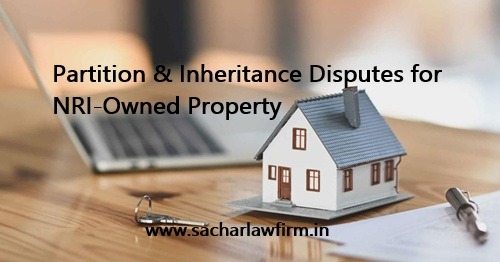AdVocate harshit Sachar | chamber no: 617 | district courts ludhiana | 2817 gurdev nagar ludhiana | ✆+91 7889228369
Partition & Inheritance Disputes for NRI-Owned Property – How Indian Courts Decide
An overview of how Indian courts handle partition and inheritance disputes involving property owned by Non-Resident Indians (NRIs).
CIVIL LAWSFAMILY LAW
Advocate Harshit Sachar Ludhiana
9/21/20252 min read


Introduction
Partition and inheritance disputes are some of the most common legal challenges faced by Non-Resident Indians (NRIs) who own property in India. With joint family ownership, ancestral properties, and multiple heirs involved, disputes often arise over possession, division, or transfer of property. NRIs, being away from India, frequently face greater difficulties in resolving these conflicts.
Indian courts follow well-defined principles of succession laws and the Code of Civil Procedure (CPC) to decide such matters. Understanding how courts interpret rights, shares, and proof of ownership is crucial for NRIs seeking justice.
1. Legal Framework Governing Partition and Inheritance
Hindu Succession Act, 1956 (as amended 2005): Applies to Hindus, Sikhs, Buddhists, and Jains; daughters have equal rights as sons in ancestral property.
Indian Succession Act, 1925: Governs succession for Christians and Parsis.
Muslim Personal Law (Shariat): Governs inheritance among Muslims, where fixed shares are provided for heirs.
Civil Procedure Code (CPC): Provides the process for filing partition suits and execution of decrees.
2. How Partition Suits Are Decided
When an NRI or their legal heir files a partition suit, courts typically follow these steps:
Establishing Title & Ownership
Court checks title deeds, revenue records, and family settlement documents.
For ancestral property, genealogical records and jamabandi/fard entries are examined.
Determining Legal Heirs and Shares
Based on succession laws, the court calculates each legal heir’s share.
In joint Hindu families, every coparcener (including daughters, post-2005 amendment) has a right.
Division of Property
If property can be physically divided, courts appoint a local commissioner to demarcate shares.
If indivisible (like a house), courts may order sale of property and distribution of proceeds.
3. Common Issues in NRI Property Disputes
Illegal Occupation: Relatives occupying the property without consent.
Forgery of Documents: Fake wills, power of attorney misuse, or illegal sale deeds.
Delay in Court Process: NRIs face difficulty attending hearings and depend on lawyers for updates.
Disputes Between Siblings: Family conflicts turning into long-drawn litigation.
4. How Courts Protect NRI Rights
Ex-parte Proceedings: If the opposite party delays or refuses to appear, courts may proceed in favor of the petitioner.
Power of Attorney Representation: NRIs can authorize local representatives or lawyers to fight cases.
Injunctions: Courts can restrain illegal sale or transfer of disputed property during litigation.
Execution of Decree Abroad: Final decrees can be enforced if the NRI resides in a country that has a reciprocal arrangement with India.
5. Practical Guidance for NRIs
Always keep title deeds, succession certificates, and family settlement agreements in order.
Execute a valid Will to prevent disputes for future generations.
In case of disputes, act quickly by filing for injunctions to prevent illegal transfers.
Appoint a reliable lawyer in India to monitor and represent your case.
Conclusion
Partition and inheritance disputes involving NRI-owned property are sensitive and often complex. Indian courts balance the principles of succession law with equitable distribution among heirs. While the legal system provides remedies for NRIs, timely action, proper documentation, and effective legal representation are key to protecting property rights.
Disclaimer
This blog is for informational purposes only and does not constitute legal advice. For advice specific to your situation, please consult a qualified lawyer.
Services
Sachar Law Firm – Advocate, Lawyer, Attorney & Solicitor Services in India | Ludhiana, Punjab.
Expert legal advice across various practice areas - Civil, Criminal, Divorce and Matrimonial, Consumer and Corporate laws, Bail Matters, Property Contract Disputes, Insurance claim disputes, cyber Crime cases, Cheque bounce, Family Divisions, Arbitration. Bail Matters, Electricity Board Cases, Appeals before Session court Ludhiana, Marriage certificate, Court Marriage, Succession Certificate Accident Claim (MACT), NRI Legal Matters, NRI Property Matters.
“Get in Touch with Sachar Law Firm”
Quick Links
© 2025. All rights reserved.
Advocate Harshit SACHAR
Legal Blog
2817, 1st Floor , Gurdev Nagar, Ludhiana, Punjab -141001
Address: Office Cum Res:
Corporate Liquidation and Recovery Litigation
☎️ 0161 7965410
